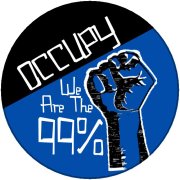By Max Anderson, Documentarian and member of Occupy Texas State
When I was a young boy I was told that I could be anything I wanted to be as long as I set my mind to it. The possibilities were endless: a doctor, a lawyer, an astronaut, a paleontologist (I really wanted to be a paleontologist), even the president. Being the optimistic kid that I was I believed them; I set my expectations high. I longed for the great pie in the sky.
As I grew older reality set in and I realized that this was not the great country I had once imagined. Before I was even old enough to work millions of jobs had been shipped overseas with the passage of NAFTA. America no longer produced goods, we just consumed them. At the age of 12, terrorists wreaked havoc on America and sent us into a decade long war that costs taxpayers trillions of dollars. With the start of theWar On Terror, so too did the encroachment on our civil liberties. In 2008, the financial crisis seemingly shut down Wall Street and left millions wondering what the future would bring. All of these factors have left me with a lack of faith in America.
And what of my fellow countrymen? When I look around all I see is an apathetic populace and a culture that is obsessed with entertainment, celebrities, sex, violence, video games, sports, and reality television. What should I expect from my fellow countrymen when they only care about the big issues as long as they can press a Like button? How could I expect them to be the watchdogs of freedom when all of the media is controlled by the 1%, the corporations. (Fox News is owned by the Fox Entertainment Group, a subsidiary of News Corporation; CNN is owned by Time Warner; MSNBC is currently part of NBCUniversal, a joint venture of Comcast and General Electric; ABC is owned by the Walt Disney Company.) These companies do not have a vested interest in informing the mass of the public, why that would be unprofitable. Instead the mainstream media divide people on hyper-partisan issues. I cannot expect the average joe to sift through all the misinformation, chatter, and noise and come to a reasonable, logical conclusion.
I do not have much faith in the future of America. This once shinning beacon of freedom and liberty has mortgaged away its future. I am of the generation that will not see prosperity and peace, instead we will face a mountain of debt and endless war. A generation with millions in prison and even more in poverty. A generation of uninsured and uninspired. A lost generation.
The Occupy Movement gives me hope, because I know that I am not the only person that is pissed off with the current state of affairs. It gives me hope, because the people are finally standing up to the status quo and making their voices heard. “Banks got bailed out, we got sold out.” “End corporate welfare.” “Money for schools and education, not for greed and corporations.” We are the 99%, and together We can make a difference.






